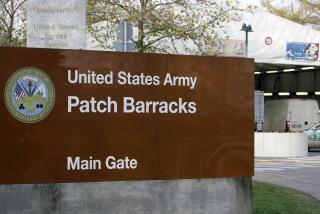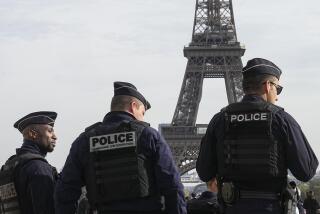Britain Expands State of High Alert
- Share via
LONDON — Thousands of soldiers and police on anti-terrorist alert extended special patrols in Britain on Wednesday, deploying at additional airports and briefly closing a London railway station in response to a bomb scare.
The intensified deployment came a day after the government, acting on intelligence about a possible terrorist attack, took the drastic step of stationing tanks and soldiers around the perimeter of London’s Heathrow Airport.
British leaders had even considered shutting down Heathrow, the nation’s top law enforcement official said Wednesday. But they decided that a shutdown would have caused great economic damage and amounted to surrendering to terrorism, Home Secretary David Blunkett said.
“For those who are threatening us, it would have been a victory,” Blunkett said.
On Wednesday, troops patrolled western London suburbs under the airport’s flight paths to guard against rocket attacks similar to the attempt by Al Qaeda members to shoot down an Israeli plane in Kenya in November.
“The symbolic importance of Heathrow indicates that it has got to be at the top of a terrorist’s priority list,” Michael Clarke, a professor at King’s College in London, told the BBC. The chief of the London Metropolitan police, John Stevens, said the operation was the highest-level terrorist alert he’s been involved in. And he said he hadn’t ruled out sending troops into the streets of London, where the busy King’s Cross rail station was briefly closed Wednesday evening because of a bomb scare. The threat turned out to be a hoax.
Special squads of armed police, meanwhile, began patrols at major airports in other cities, including Manchester, Bristol, Birmingham, Leeds, Stansted and Jersey, in the Channel Islands. Manchester police shut down an airport parking lot as a precaution.
The Manchester security operation resulted from “public concerns and fears, based on speculation, following the announcement of the use of military personnel at Heathrow and public concerns relating to the possibility of a forthcoming war against Iraq,” said Chief Inspector Martin Gaffney, head of Greater Manchester Police.
A Scotland Yard spokesman called the mind-set of the authorities one of “alert, not alarm.” Once a haven for leading Islamic extremists, Britain has been on guard for months. Working with French police, British law enforcement officials have made several dozen arrests aimed mostly at the Al Qaeda terrorist network, whose members allegedly scouted the London subway for a cyanide gas attack and produced ricin poison for another plot.
U.S. leaders intent on confronting Iraq have tried to link that network, which has a presence in Spain and France as well, to the regime of President Saddam Hussein. But many European counterterrorism officials reject the idea of an Iraq-Al Qaeda alliance.
In an appearance in Parliament on Wednesday, Prime Minister Tony Blair told legislators that he ordered the special alert “to give people the protection and security they need” against a danger that exists in “virtually every European country and many other countries across the globe.”
Nonetheless, other European countries didn’t deploy special security measures Wednesday.
On Tuesday, an audiotape was made public in which a voice believed to be that of Osama bin Laden called for Muslims to attack the West if there is a war in Iraq. Britain has committed to deploying about 45,000 troops to the Persian Gulf region for a possible invasion of Iraq, which Blair describes as part of a global terrorist threat.
The leader of Blair’s Labor Party reacted indignantly Wednesday to suggestions that the government’s security blitz might have been intended partly to counter public disgruntlement with its Iraq policy.
“This is not a game,” said John Reid, the Labor chairman. “This is about a threat of the nature that massacred thousands of people in New York.”
Reid, however, later qualified that apparent comparison to the Sept. 11 attacks.
“I was attempting to make clear this is not some sort of PR exercise,” Reid said. “The nature of international terrorism which the people of this country and other countries face is so serious that no government would involve themselves in using that for PR or spin purposes.”
*
Stobart reported from London and Rotella from Paris.
More to Read
Sign up for Essential California
The most important California stories and recommendations in your inbox every morning.
You may occasionally receive promotional content from the Los Angeles Times.













